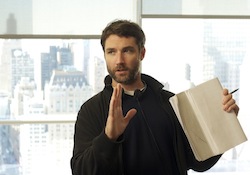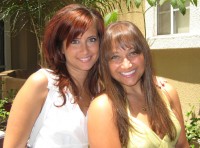Last year, Jay Faerber wrote a First Person post on [his experience in the Warner Bros TV Writers Workshop](http://johnaugust.com/2011/transitioning-from-comics-to-tv). At that time, he was just finishing up the workshop and staffing season was underway. I asked him for an update.
—
![]() The great thing about the Warner Bros workshop (in addition to what I learned in the program itself) is that it creates a strong incentive for any Warner Bros show that wants to hire a workshopper: the workshop will pay your salary for about the first 13 episodes. So it really gives workshop people a leg up when going out on meetings and competing against other lower-level writers.
The great thing about the Warner Bros workshop (in addition to what I learned in the program itself) is that it creates a strong incentive for any Warner Bros show that wants to hire a workshopper: the workshop will pay your salary for about the first 13 episodes. So it really gives workshop people a leg up when going out on meetings and competing against other lower-level writers.
Despite that, as any writer will tell you, staffing season is enormously stressful.
While I had that great Warner Bros backing, I was still competing with the seven other drama writers from my workshop. I ended up going on meetings for two bubble shows, plus another pilot. Then upfronts happened, and the two bubble shows were cancelled and the pilot didn’t get picked up.
At this point, I think most of my workshop colleagues had already been staffed, so I was starting to sweat a little. Then Ringer, which had been developed for CBS, got picked up by The CW, which made it a Warner Bros show and therefore a viable option for workshop graduates. I got a meeting on Ringer and was able to get a meeting on another Warner Bros pilot that had been picked up, and if I remember correctly, I got an offer to join the Ringer staff the evening after I had my meeting.
I accepted the offer and started work the Wednesday after Memorial Day.
Getting down to work
—-
That first day at Ringer had a kind of first-day-of-school feeling, as all the writers got to know each other. It became apparent pretty quickly that I had lucked out — everyone on the writing staff was really cool.
One of the things that really stuck with me from the workshop was the importance of determining what’s expected of the staff writer. Some writers’ rooms adhere to a strict hierarchy and the staff writer is expected to only speak when spoken to (if that!). Others take an all-writers-are-created-equal approach, and everyone’s encouraged to chime in.
But it can get even more complicated than that.
I heard a story of a staff writer who’d been told by a higher level writer to keep his mouth shut and sit back and learn, but then the showrunner declined to pick up the staff writer’s option (after the 13th episode) because the staff writer never contributed. Whether this was a misunderstanding or deliberate sabotage by the higher level writer is up for debate. But I made it a point on that first day to simply ask our showrunner what she expected of me. She made it clear that all of us were expected to contribute.
On Ringer, all the stories were broken collectively by the writers in the room. Once we had the story fully boarded (all of the beats up on the white board), the writer of that episode would go off to write the story arena (or story area — different shows call them different things), then the outline, and then the script.
I’ve been a comic book writer for a long time, so this collaborative way of breaking stories was new to me, but I think I took to it pretty well. And my background helped in other ways. Serialized shows like Ringer have a lot of plot threads to keep track of, as do comics, so my brain was automatically wired for that.
Learning to love the white board
—-
Our writers’ room was lined on three walls with white boards. On the fourth wall was a TV. There were no windows. As the season progressed, two whole walls were taken up with charting the plot developments for each of the main characters in each episode. This helped us keep track of the various plot threads. The remaining third wall was what we used to break the story for each episode.
We’d start out by breaking each character’s story in a linear fashion. Bridget was usually the “A” story, then maybe a Machado or Andrew or Juliet “B” story, then a Siobhan “C” story, then sometimes a Flashback story. Once we had all these stories broken to our satisfaction, we’d start “blending” them — weaving the various stories together and figuring out where they fit into each act.
I quickly became the go-to guy to write on the white board throughout this process. I have good handwriting, and I didn’t mind doing it. It gave me a clear role in the room, and let me feel like I was contributing something even when I wasn’t pitching ideas.
I was also the only writer on staff with an active Twitter account (you can follow me [@JayFaerber](http://twitter.com/JayFaerber)), so I would sometimes Tweet about the show. It was an interesting experience. I wasn’t the “official” spokesman for the show by any means, but I tried to be accessible to fans. Most of my answers were probably vague and unsatisfying, since so many of them were of the “You’ll find out…” or “That’s not my department” variety. And because I was just a staff writer, I didn’t have the authority to be as forthcoming as Shawn Ryan or Jeff Eastin when they’re tweeting about their shows. But it was still fun (for the most part) to interact with the fans.
As is standard in TV, all the writers had initial contracts for the first thirteen episodes, and after that the showrunner could chose to pick up our option…or not. I was kept on, and over the course of the first season I got three scripts: one solo, and two that I co-wrote.
We shot Ringer in LA, and the writers were on set for the entire production of their episodes, which means I got a chair with my name on it and everything.
Someone once said that being a writer on set is like being a fireman — you sit around for long periods of time, and occasionally someone needs you. And that’s a pretty apt description. Most television directors are basically hired guns — they come in, direct an episode, and move on to the next gig on another show. As talented as these directors can be, they don’t always know the show, so it’s important for one of the writers to be there to make sure what’s being shot captures what we intended.
Not every show sends their writers to set. I have friends who wrote on shows that shot out of town, and they never got to be involved in production. And while these friends have been TV writers longer than I have, I feel like I have a leg up on them when it comes to production.
Back on the market
—
Ratings on Ringer haven’t been great and as we ended the season we were very much a “bubble show.” We might get renewed, we might not. The powers-that-be at The CW are probably waiting to see how their pilots turn out before they make any decisions.
This means that I’m going out for staffing season again. It’s a different experience now, since I’m not fresh out of the workshop. I’m competing with every other staff writer and story editor out there — not to mention this year’s new workshop graduates. But I’ve also got a year of experience under my belt, including three produced scripts.
I’m discovering staffing season requires you to be in a weird emotional space.
I want Ringer to come back because I love working with the writers and I really enjoy the world we spent the past year building. It’s a good job, and I’d like it to continue.
But in order to go out and meet with the showrunners of other shows, I have to sort of emotionally disconnect from Ringer so that I can allow myself to get excited about the idea of working on something else.
This isn’t a unique situation I’m in — a lot of shows end their season not knowing if they’re going to renewed. This type of emotional disconnect seems to be something worth developing if you’re going to have a career in TV.
I’ve spent the past couple months reading pilots and going on meetings for new shows, but I’m also still in touch with all the writers from Ringer. Hopefully we’ll be back in our writers’ room next season, and if not, I can only hope my next job is as great as my first one.
 Take [Swamp People](http://www.history.com/shows/swamp-people) on History Channel. Due to the treachery that is quite skillfully built into each episode, viewers are led to believe that alligator hunting is a dangerous, even deadly occupation. The truth is that in the history of alligator hunting there have been very few human deaths. (I haven’t found an account of a single serious injury — if you do, let me know.)
Take [Swamp People](http://www.history.com/shows/swamp-people) on History Channel. Due to the treachery that is quite skillfully built into each episode, viewers are led to believe that alligator hunting is a dangerous, even deadly occupation. The truth is that in the history of alligator hunting there have been very few human deaths. (I haven’t found an account of a single serious injury — if you do, let me know.)  In 2007, I moved from New York City to Los Angeles to pursue a screenwriting career. I did it by way of the Peter Stark Producing Program at USC, where I was fortunate to meet some of my very best friends.
In 2007, I moved from New York City to Los Angeles to pursue a screenwriting career. I did it by way of the Peter Stark Producing Program at USC, where I was fortunate to meet some of my very best friends.